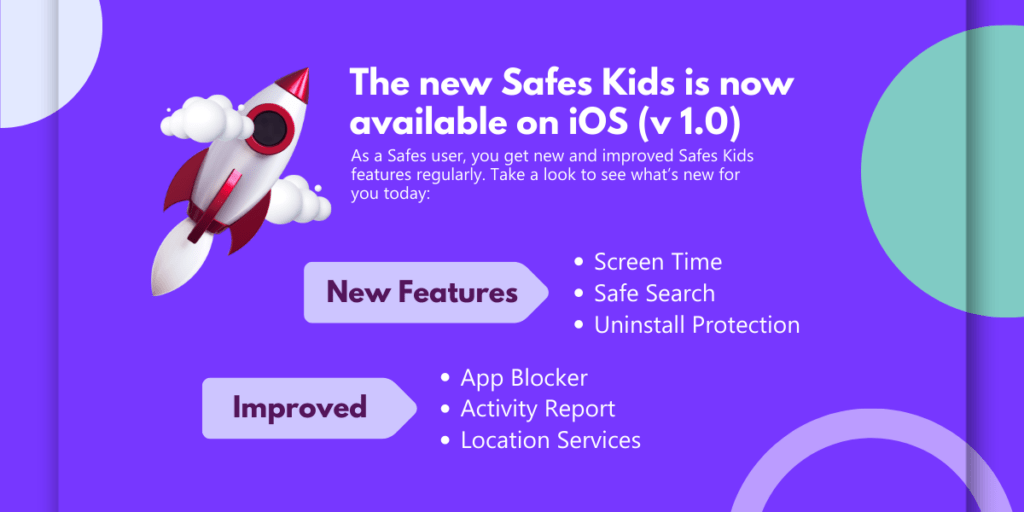As parents, we all want to raise happy, confident, and responsible children. One effective way to achieve that is through the authoritative parenting style. This approach is characterized by high demands and high responsiveness, resulting in a balanced and nurturing environment for children to grow and thrive. In contrast to authoritarian or permissive parenting, authoritative parenting has been shown to lead to better academic performance, mental health, and social skills in children. If you’re a parent looking to create a positive and supportive home environment, then implementing an authoritative parenting style might be the right choice for you. In this blog post, we’ll discuss the key principles of authoritative parenting and provide practical tips on how to implement it in your home.
Download and Start Your Free Trial of the Safes Parental Control App
Setting Clear Expectations
Setting clear rules and boundaries is crucial for children’s emotional and psychological development. It helps them understand what is expected of them, keeps them safe, and provides a sense of structure and stability. Authoritative parents set expectations in a positive and respectful manner, explaining the reasons behind the rules and encouraging their children to ask questions and express their feelings. For example, instead of saying, “You can’t watch TV now because I said so,” they might say, “We agreed to limit screen time to one hour a day, so let’s find something else to do together.” In contrast, authoritarian parents may impose strict rules without offering explanations or room for negotiation, leading to resentment and rebellion from their children.
Consistency is key to making expectations effective, as children need to know that the rules apply equally in all situations and that there are consequences for breaking them. By setting clear rules and boundaries in a positive and respectful manner, authoritative parents can create a supportive and nurturing environment that promotes their children’s growth and well-being.
Practicing Positive Reinforcement
Positive reinforcement is a crucial aspect of authoritative parenting, which involves rewarding good behavior to encourage its repetition. It is based on the principle that children are more likely to repeat behaviors that are followed by positive consequences, such as praise, attention, or rewards. Positive reinforcement is important because it helps children develop a sense of self-worth and competence, strengthens the parent-child bond, and fosters a positive and supportive home environment.
Examples of positive reinforcement in the authoritative parenting style include praising good behavior, offering small rewards (such as stickers or extra screen time), and spending quality time together. To use positive reinforcement effectively, parents should be specific and sincere in their praise, focus on effort rather than outcome, and avoid over-reliance on rewards that can lead to entitlement or bribery.

Building Open Communication
Open communication is a crucial aspect of the authoritative parenting style, as it helps parents and children build trust, understanding, and respect. By encouraging open communication, parents can create a safe and supportive environment where children feel comfortable expressing their thoughts, feelings, and concerns.
Examples of how to encourage communication in an authoritative parenting style include active listening, asking open-ended questions, and responding in a non-judgmental and empathetic manner. When handling difficult conversations, such as discipline or boundary-setting, authoritative parents use a calm and assertive tone, explain the reasons behind their decisions, and offer their children a chance to express their opinions and feelings. They avoid using harsh or punitive language, focus on the behavior rather than the child, and offer constructive feedback and guidance.
By promoting open communication in an authoritative and respectful manner, parents can build strong and lasting relationships with their children and help them develop the skills and values they need to succeed in life.
Balancing Expectations with Empathy
While setting clear expectations and boundaries is essential in authoritative parenting, it is equally crucial to balance them with empathy and understanding. Children need to feel heard, valued, and supported, especially when facing challenges or setbacks.
Examples of practicing empathy in parenting include acknowledging children’s emotions, offering validation and support, and helping them develop coping skills and resilience. For instance, if a child is upset about a bad grade, an authoritative parent might say, “I understand that you’re disappointed, but let’s figure out what went wrong and how we can improve next time.”
To maintain authority while still being a compassionate and understanding parent, it is essential to set limits and consequences in a consistent and fair manner while also offering encouragement and praise for good behavior. An example of authoritative parenting is when a parent sets a curfew for their teenager but also explains why it’s important to be home on time and offers to drive them if needed.

How Does Safes Help Improve Your Parenting?
Safes parental control app is a powerful tool that can help parents improve their parenting by allowing them to control their children’s online experience. With Safes, parents can monitor and control the apps, websites, and content their children can access on their devices, ensuring they are safe and appropriate. The app also allows parents to set time limits for their children’s screen time, helping them balance their online and offline activities.
Safes is available for both Android and iOS devices, making it accessible to a wide range of users. By using Safes, parents can have peace of mind knowing that their children are safe and responsible online while also promoting healthy habits and behaviors. Overall, Safes is a valuable tool for any parent looking to improve their parenting skills and keep their children safe in the digital age.
Interested in learning more about Safes? Find out more information here:
- Windows parental controls
- Macbook parental controls
- Parental controls on Android
- iPhone parental controls
Conclusion
Parenting is a challenging journey that requires patience, understanding, and commitment. By adopting an authoritative parenting style, parents can create a positive and nurturing environment that promotes their children’s growth and well-being. Key principles of authoritative parenting include setting clear rules and boundaries in a positive and respectful manner, using positive reinforcement to encourage good behavior, promoting open communication and empathy, and balancing expectations with understanding.
Additionally, tools like the Safes parental control app can help parents monitor and control their children’s online experience, ensuring their safety and well-being. By practicing authoritative parenting and using the right tools, parents can create a supportive and loving environment that helps their children become confident, responsible, and successful adults.
Your Child’s Online Safety Starts Here
Every parent today needs a solution to manage screen time and keep their child safe online.
Without the right tools, digital risks and excessive screen time can impact children's well-being. Safes helps parents set healthy boundaries, monitor activity, and protect kids from online dangers—all with an easy-to-use app.
Take control of your child’s digital world. Learn more about Safes or download the app to start your free trial today!




